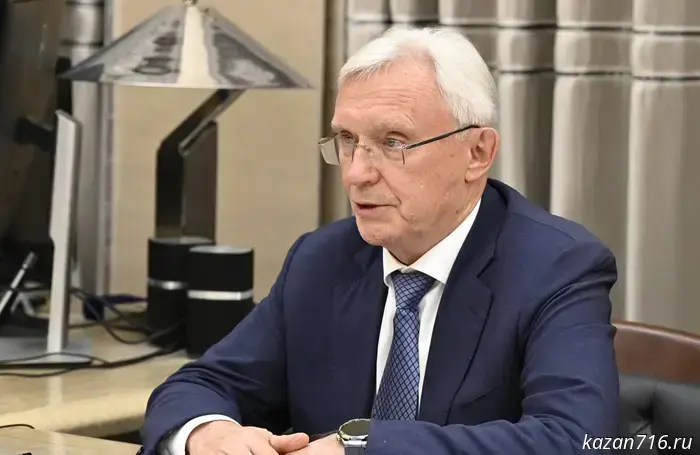
Autonomous vehicles, personnel and in-house software: Kogogin told Mishustin how KAMAZ is changing the auto industry.
KAMAZ increased its share of the Russian market to 34%
“KAMAZ’s market share is 34%”
The CEO of KAMAZ, Sergey Kogogin, met today with the Prime Minister of Russia, Mikhail Mishustin. A similar meeting took place almost a year ago in Moscow. The occasion was not only to check on KAMAZ’s condition but also to compare notes on import-substitution projects — in 2022 the Prime Minister appointed Kogogin head of the Industrial Center of Competence (ICC) “Automotive Manufacturing.”
Mishustin reminded those present what the group does: it produces vehicles for freight and passenger transport, dump trucks and crane-manipulators, tractor units, buses and electric buses.
“The industrial growth and the economy of the entire country directly depend on the results of your company’s activities,” the Prime Minister said.
Kogogin painted the picture: “Every day millions of KAMAZ vehicles take to the streets of our cities and our roads.”
He also outlined the market in which the company currently operates: according to forecasts, about 50,000 heavy trucks are expected to be sold this year. “KAMAZ’s share of this market is already 34%. It has doubled compared to 2024,” the CEO reported.
He noted that the Government took timely measures necessary to support the market. Special attention was given, of course, to passenger transport.
“When new good buses or electric buses appear on the streets of our cities, it strongly affects people’s mood, the rhythm of movement, and the population’s mobility. This year we promptly decided to allocate additional funds for subsidies to the regions; this affected the workload of our enterprises,” Kogogin explained.
They also resolved the issue of axle loads. “To some extent, control over weight loads had been suspended. This damaged roads and bridges. And for us, as law‑abiding manufacturers, it was difficult to compete with such transport. This has all now been resolved,” the head of KAMAZ said.
KAMAZ’s autonomous vehicles are being tested on the Moscow–Kazan route
KAMAZ continues to expand exports — this year they are expected to grow by 10%, and not so much due to neighboring countries (which was traditionally the manufacturer’s market) but mainly to more distant ones.
“This is Asia, this is the Middle East, where we regularly send our vehicles. The company achieved these results thanks to a lot of hard work,” Kogogin emphasized.
He also spoke about expanding the model range and again noted Government support in launching the new-generation K5 series. They also developed the engine lineup — now the entire series can run on gas.
He placed special emphasis on unmanned vehicles: autonomous vehicles run on the Moscow–St. Petersburg route. “We have now expanded the experimental mode to Kazan, where testing of our highly automated (unmanned) vehicles is underway,” Kogogin added.
The company continues to develop the K5 series by adding an all-wheel-drive family. They are designed for harsh climatic conditions — the North. They are mainly purchased by oil companies.
“We also pay significant attention to military transport. For the security forces we have developed six models of vehicles that have a high level of protection. In today’s conditions, of course, this is saving the lives of our citizens, our fighters,” Kogogin stressed.
Concluding his report, the CEO expressed the view that the market has reached a level of stabilization. “What has changed? Customer requirements for vehicles have increased: they need comfort, good specific fuel consumption and vehicle reliability with long service intervals. All these tasks have been solved by the company. We expect to continue moving in this direction,” he said.
Russia will create a domestic PLM system for the automotive industry by 2030
Mishustin noted the company’s efforts in developing the model range and in import substitution of software.
He clarified the extent to which KAMAZ is now engaged in searching for “sovereign solutions,” including in the design and operation of its products.
Kogogin said that after Mishustin appointed him head of the ICC “Automotive Manufacturing,” he “tried to dive deeply into the topic.”
He reported concrete results of developing domestic IT solutions for automakers with a presentation.
“First. KAMAZ became the final contract holder under an agreement with the Ministry of Industry and Trade to create a full-fledged product lifecycle support system. Everything our developers did, as they say, in pieces: here, there, there — we tried to assemble it into a single whole,” the head of the ICC said.
Product Lifecycle Management (PLM) systems are a complex of software solutions and tools that provide management of data, processes and interactions that accompany a product at all stages of its existence — from idea and design to production, operation and disposal.
He said the enterprise hired employees from Siemens in the areas of task setting and sales.
“On this diagram you can see what today’s system looks like. This is the Western product. And today we are here. And by signing the contract, under the agreement we must, by 2030, reach the level that ensures the system’s full functioning,” Kogogin showed in the presentation.
Simple elements have already begun to be designed in the Russian CAD system T-FLEX.
“Moskvich” was completely cut off from everything, and it switched to a domestic product
Kogogin demonstrated a slide showing what the IT landscape of the industrial enterprise looks like overall.
“And when we began to analyze what industry has done, I, frankly, rejoiced, Mikhail Vladimirovich,” Kogogin smiled.
Mishustin, having examined the presentation, noted: “Planning, ERP (Enterprise Resource Planning), transport logistics — all on Russian systems...”
Kogogin immediately pointed out that KAMAZ was one of the leaders in implementation and is now transitioning from foreign software to domestic developments.
“What did we do? First, the Moskvich plant. Since it was cut off from everything, it completely switched to a domestic product. That is, we did not try to hand it something from KAMAZ — we simply migrated it...” Kogogin reported.
He noted that SAP (Systems, Applications, and Products) — programs for managing company business processes — have “shortcomings in terms of production flexibility.” And for KAMAZ, for example, this always caused problems.
“What we are doing now with a Russian vendor is free of these shortcomings,” Kogogin said with pleasure.
Mishustin instructed them not to slow the pace of work so that import-substitution projects would be implemented.
“We will continue to meet with you regularly, gather experts. Industrial Centers of Competence will continue to work with you. This is already bearing fruit. We already have a fairly high implementation rate, but we must keep our finger on the pulse,” Mishustin added.
He asked Kogogin to “actively engage in this, gather people and regularly report to the Government.”
“So that as many young guys ‘with burning eyes’ as possible come to you”
They also touched on the topic of personnel. Mishustin said he knows that KAMAZ has been seriously engaged in staff training programs and asked what is happening in this area.
Kogogin said the company formed alliances — scientific and educational centers at various levels, including advanced engineering schools.
He noted that for KAMAZ the number-one partner in training is Bauman University. At Bauman Moscow State Technical University a scientific and educational center was opened that works on projects for the Naberezhnye Chelny enterprise. There they train students who during their studies work on specific KAMAZ projects — creating a quarry dump truck and logging equipment. These are also projects that should replace imported machines.
“It must be said that the work was done at a very good level. Pilot batches were manufactured and sent for test operation. In particular, the logging equipment showed close characteristics practically from the first try — in terms of labor productivity and ease of operation,” Kogogin again proudly spoke of his import‑substitution projects.
In Naberezhnye Chelny there is the Institute of Automotive Engineers of Kazan Federal University — 8,500 students.
“A huge branch,” Mishustin remarked.
“Yes, it is large. The advanced engineering school organized there changed the atmosphere of the university. They simply began to approach tasks differently. Their eyes burn, like those of heads of laboratories... We invested there, together with the federal Government and the republic, quite large sums. We managed to buy all the advanced equipment. Today the university can conduct the research we need. And we see this advanced engineering school not only as KAMAZ’s school, but as a school for the entire automotive industry,” Kogogin said.
“That is so,” Mishustin replied.
“Agreements have been signed between the universities and enterprises in Nizhny Novgorod and Tolyatti as well. We prepare specialists for everyone.
A breakthrough inevitably occurs because we are already able to transfer part of our research work to the universities’ research base and for basic teacher training, knowing that we will get results.
I can cite as an example the advanced engineering school with Ural Federal University (UrFU), where competencies in diesel engine development that had been lost in our country were effectively restored,” Kogogin said.
At the end of the meeting Mishustin wished him luck and success.
“And, of course, so that as many young guys as possible, who study, as you said, ‘with burning eyes,’ come to your production, create new comfortable, high-quality cars, dump trucks, tractor units, and electric buses and delight our country and the people with modern and competitive machines,” the Prime Minister said.
Photo: government.ru
Другие Новости Казани (Казань716)
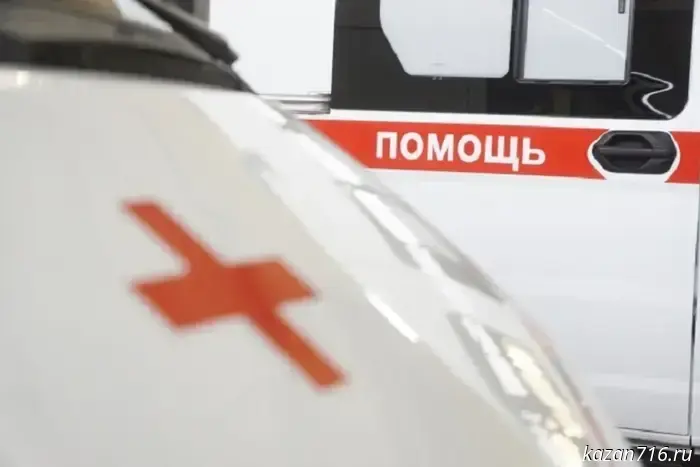 In Kazan, seven tourists from the Moscow region were hospitalized with salmonellosis.
Everyone thought they had food poisoning at the hotel restaurant
From the very beginning the symptoms pointed to a gastrointestinal infection. 22.10.2025. Komsomolskaya Pravda Kazan. Republic of Tatarstan. Kazan.
In Kazan, seven tourists from the Moscow region were hospitalized with salmonellosis.
Everyone thought they had food poisoning at the hotel restaurant
From the very beginning the symptoms pointed to a gastrointestinal infection. 22.10.2025. Komsomolskaya Pravda Kazan. Republic of Tatarstan. Kazan.
 The Kaleb Association is organizing a memorial concert for Haydar Bigichev at the Tatar Philharmonic.
At the Tatar State Philharmonic named after Gabdulla Tukay, the creative association "Kaleb", as part of the "Kaytavaz" ("Echo") concert series, will organize a concert on November 13 dedicated to People's Artist of the Tatar ASSR Haydar Bigichev. 22.10.2025. Tatar-inform News Agency. Republic of Tatarstan. Kazan.
The Kaleb Association is organizing a memorial concert for Haydar Bigichev at the Tatar Philharmonic.
At the Tatar State Philharmonic named after Gabdulla Tukay, the creative association "Kaleb", as part of the "Kaytavaz" ("Echo") concert series, will organize a concert on November 13 dedicated to People's Artist of the Tatar ASSR Haydar Bigichev. 22.10.2025. Tatar-inform News Agency. Republic of Tatarstan. Kazan.
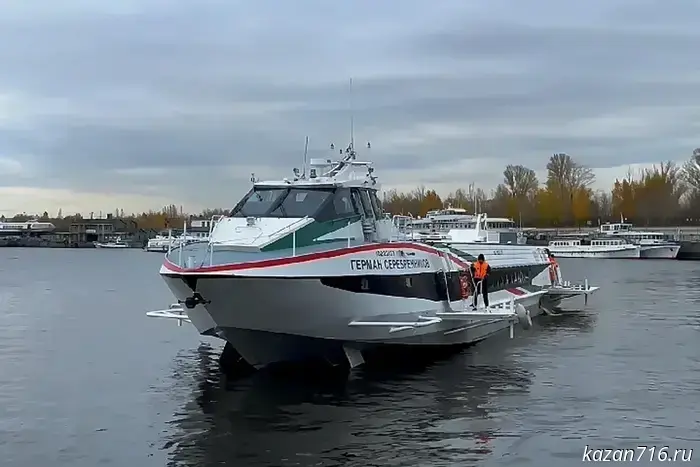 In Kazan, the new Meteor "German Serebrennikov" made its maiden voyage.
A passenger vessel made its way to Sviyazhsk
The high-speed hydrofoil can carry up to 120 passengers at a time. October 22, 2025. Komsomolskaya Pravda Kazan. Republic of Tatarstan. Kazan.
In Kazan, the new Meteor "German Serebrennikov" made its maiden voyage.
A passenger vessel made its way to Sviyazhsk
The high-speed hydrofoil can carry up to 120 passengers at a time. October 22, 2025. Komsomolskaya Pravda Kazan. Republic of Tatarstan. Kazan.
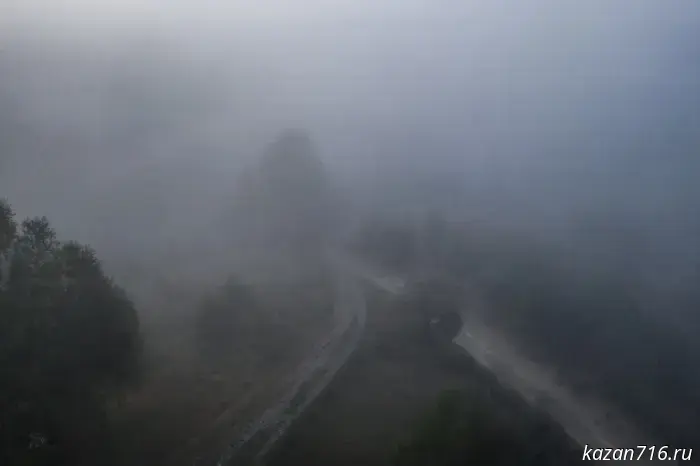 Fog is expected in Tatarstan.
From 20:00 on October 22 and during October 23, fog is expected across Tatarstan. 22.10.2025. GTRK Tatarstan. Republic of Tatarstan. Kazan.
Fog is expected in Tatarstan.
From 20:00 on October 22 and during October 23, fog is expected across Tatarstan. 22.10.2025. GTRK Tatarstan. Republic of Tatarstan. Kazan.
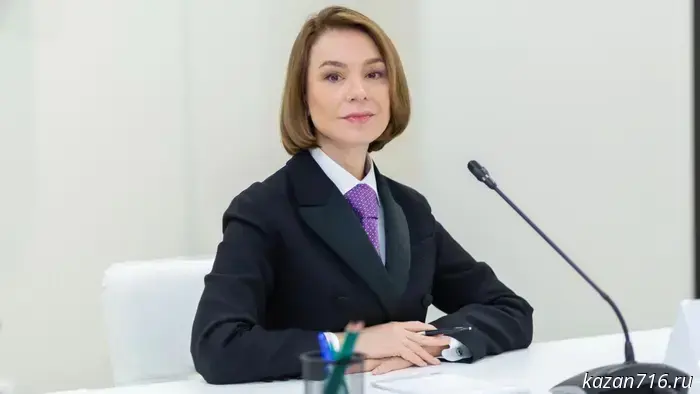 The minimum wage will be increased by 20 percent.
The State Duma approved in the first reading amendments to Article 1 of the Federal Law "On the Minimum Wage". October 22, 2025. Menzelinsky District. Republic of Tatarstan. Menzelinsk.
The minimum wage will be increased by 20 percent.
The State Duma approved in the first reading amendments to Article 1 of the Federal Law "On the Minimum Wage". October 22, 2025. Menzelinsky District. Republic of Tatarstan. Menzelinsk.
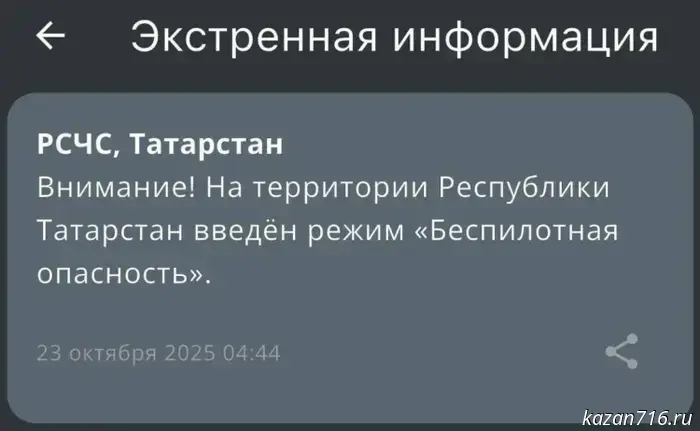 A regime of drone danger has been introduced in Tatarstan.
In Tatarstan, at 04:44, a drone threat alert was declared. This was reported in the official app of the Russian Ministry of Emergency Situations. 23.10.2025. GTRK Tatarstan. Republic of Tatarstan. Kazan.
A regime of drone danger has been introduced in Tatarstan.
In Tatarstan, at 04:44, a drone threat alert was declared. This was reported in the official app of the Russian Ministry of Emergency Situations. 23.10.2025. GTRK Tatarstan. Republic of Tatarstan. Kazan.
Autonomous vehicles, personnel and in-house software: Kogogin told Mishustin how KAMAZ is changing the auto industry.
KAMAZ increased its share of the Russian market to 34% "KAMAZ's market share is 34%" KAMAZ CEO Sergey Kogogin was received today by the Prime Minister of Russia, Mikhail Mishustin. 22.10.2025. Tatar-inform news agency. Republic of Tatarstan. Kazan.
